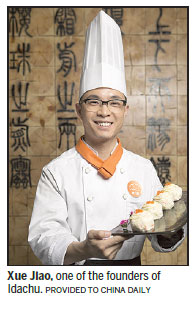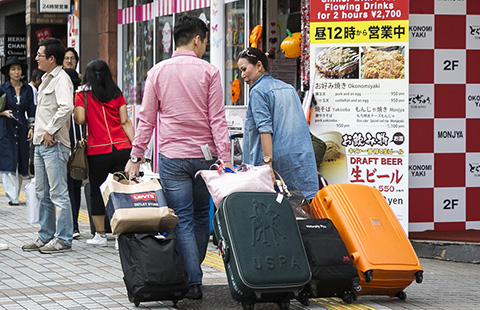Farewell to the drudgery of the industrial kitchen
Updated: 2015-10-12 14:05
By Liu Zhihua(China Daily USA)
|
||||||||
Mobile app Idachu helps chefs break free of routine by connecting them to families directly
Families are enjoying the treat of having their own chef, and chefs are enjoying the freedom of being their own bosses.
First it was the Internet service that delivered fresh food to your door; then came the taxi app that got you home quickly so you use that food to cook a great dinner for your family; now you can simply forget the first two and have a chef come over and whip up a taste sensation that makes you wonder why this kind of thing was not invented years ago.
Welcome to the world of chefs for hire, something families in big cities all across China are latching on to as an alternative to heading out to packed and noisy restaurants.
Two months ago, a Beijing resident, who wanted to be identified only as Mr Yan, says he used an app called Idachu (literally love great chefs) to book a chef to cook for his family for the first time, and that has grown into a once-a-week ritual.
"Using such an app to reserve a chef is just as convenient as using Uber to call for a car," Yan says.
"It feels great to have a chef working in your own home because the whole cooking process takes place before your very eyes, and you don't need to worry about kitchen hygiene or food safety issues."
Good restaurants are either too pricey or are too crammed and noisy, but dining at home means a cozy and quiet environment, he says.
Yan, who likes cooking, says it also means he can get a few pointers from an expert.
He is one among many people using such online-offline apps that allow people to hire professional chefs to cook a dinner in their houses or for a party.
Apps such as Idachu, based in Beijing - another well known one is Haochushi, based in Shanghai - are very user-friendly, Yan says. He can choose a chef from listings based on ratings and distance in different cuisine categories.
The location-based service can also assign a chef automatically to fulfil the task, if Yan tells the app the service address, time, numbers of expected courses and other requirements. The cost is reasonable, especially compared with fancy restaurants, Yan says.
Users can buy ingredients themselves or ask chefs to buy them and then reimburse them.
Usually you will pay a chef 69 yuan ($15.60) to cook a four-course dinner, 99 yuan for a six-course dinner, and 129 yuan for a 12-course dinner. Each additional dish costs 15 yuan.
After submitting an order, users can communicate with chefs directly by e-mail or phone about their preferences or dislikes. There are also set menus, which often are for eight to 12 diners, that cost between 1,600 yuan and 10,000 yuan.
Hou Pengfei, co-founder of Idachu, believed to be the first app in China to provide such a service, says the startup was established in late 2012, and the app went online about a year later.
The app has a total of more than 1,600 chefs in Beijing, Shanghai, Guangzhou and Shenzhen in Guangdong province, and more than 500,000 users, he says.
People can also book Idachu chefs through its website, WeChat or by phone.
"There is huge, unmet market demand," Hou says. "Chefs are also keen to make money through the kinds of apps." Hou says.
Chefs in China are usually poorly paid, even if they work for big restaurants or hotels, he says.
Many of the chefs who make their services available through the app also work in restaurants or hotels, he says, and about 10 percent work full time using the app.
Qin Zhanwen, 28, of Guangdong province, says he has been a full-time chef using Idachu for about a year. He specializes in Cantonese and Sichuan cuisine, and has more than 12 years' kitchen experience, he says.
The app not only gives him income but has opened up a new world for him, he says.
"Working in a hotel, everything in my career path seemed to be very predictable, and there was no excitement. Working through Idachu has a completely different feel. I'm able to look after various people, including celebrities, and can deal with them directly, so I know what they like and don't like in my cooking."
He gets great satisfaction from customers complimenting him on his cooking and thanking him - a direct human touch that was impossible when he worked in a restaurant kitchen.
However, the thing he values most about his new life is the freedom to manage his own time.
He often needs to use public transport to get to his places of work, which can sometimes be time-consuming and tiring, but he prefers that to staying in a kitchen all day, as he used to.
Hou says the company has yet to make a profit but hopes eventually to do so by selling food ingredients, cooking education and personalized set menus, instead of just being a chef service agency.

(China Daily USA 10/12/2015 page9)

 Chinese spending spree drives Japanese economy
Chinese spending spree drives Japanese economy
 Designers who stood out at the 2015 International Youth Designer Fashion Show
Designers who stood out at the 2015 International Youth Designer Fashion Show
 Chasing time: Man amasses large watch collection
Chasing time: Man amasses large watch collection
 Palace Museum's western part opens for first time in 90 years
Palace Museum's western part opens for first time in 90 years
 Vivid sand sculptures attract visitors in Hunan
Vivid sand sculptures attract visitors in Hunan
 One killed in Northern Arizona University shooting
One killed in Northern Arizona University shooting
 Students join outdoor courses in countryside
Students join outdoor courses in countryside
 Stewardesses trained to show sweet smile
Stewardesses trained to show sweet smile
Most Viewed
Editor's Picks

|

|

|

|

|

|
Today's Top News
Tu first Chinese to win Nobel Prize in Medicine
Huntsman says Sino-US relationship needs common goals
Xi pledges $2 billion to help developing countries
Young people from US look forward to Xi's state visit: Survey
US to accept more refugees than planned
Li calls on State-owned firms to tap more global markets
Apple's iOS App Store suffers first major attack
Japan enacts new security laws to overturn postwar pacifism
US Weekly

|

|





